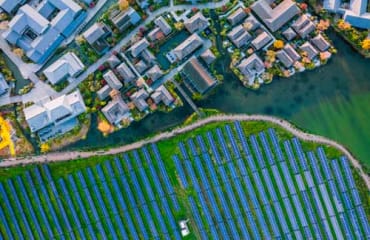This article was originally published in Medium under the headline: Why Toniic members invested in Lombard Odier Sustainable Credit.
With energy demand in the US forecasted to grow six times faster for the rest of the decade, decarbonisation through decentralisation represents one of the most promising and resilient solutions applicable across a range of industrial verticals. While climate solution providers have achieved profitability and are seeing tremendous demand, fragmented markets and inefficient financing options challenge their path to scale.
Traditional sources of financing including regional banks continue to retrench while non-dilutive options such as private debt capital continues to skew to hyperscale (large utility projects), favouring private equity-sponsored deals with USD 100 million-plus checks. Sponsored direct lending has seen considerable concentration, with 80% of assets chasing the less than 10% of middle market companies which are sponsored.
Read also: Widen the net: the case for non-sponsored direct lending exposure
Lombard Odier Sustainable Private Credit
Away from this competitive tension, Lombard Odier Investment Managers (LOIM) collaborates directly with family-owner operator-led businesses to provide capital logistics solutions as companies aggregate larger pools of decentralised assets to meet scaled demand. By unlocking scaled distributed climate solutions, LOIM seeks to provide access to differentiated risk-adjusted return profiles and impact outcomes that can be difficult to achieve via monolithic solutions.
The LOIM Sustainable Private Credit strategy provides tailored direct lending solutions to North American climate solution providers — accelerating distributed businesses including community solar, battery energy storage, and advanced grid-edge computing. Their mission is profit with purpose, and we believe their differentiated team history may provide an edge in sourcing and structuring deals for these underfinanced markets. They believe the risk-reward spectrum is shifting in favour of non-sponsored strategies, particularly in these specialised industries. The team focuses on shorter duration (two–to-three-year, USD 10-25 mn) senior-secured credit facilities and seeks to unlock additional value for investees with the engagement of LOIM’s best-in-class sustainability resources (a dedicated 40-plus person team).
Transaction examples
The community solar industry is expected to more than double by 2027, bringing affordable, clean energy to more people across the country. Aspen Power is a distributed energy platform with a dual mission of accelerating and widening access to clean energy. Aspen Power brings renewable energy development and participation to communities in the US that are seeking clean power and energy savings.
A community solar project enables several participants to reap the benefits of a shared solar installation. This innovative approach opens up solar energy access to households that can’t install panels on their rooftops – representing over half of Americans. This includes renters, residents of multi-tenant buildings, and those who can’t afford the installation costs or lack suitable roofs for solar arrays. By subscribing to a community solar project, participants receive credits on their electricity bills based on their share of the electricity generated, making renewable energy more accessible and affordable for everyone.
Aspen Power’s community solar projects have provided access to clean energy to more than 4,400 households, helping them achieve an average cost reduction of 10%.
Following LOIM’s investment, Aspen enabled the production of almost 320,000 MWh of clean electricity in 2023, helping avoid more than 17,000 tons of CO2. Furthermore, Aspen Power’s community solar projects have provided access to clean energy to more than 4,400 households, helping them achieve an average cost reduction of 10% in their electricity bills. Aspen Power aims to continue its expansion and serve over 35,000 households in the next five years.
Co-founded by an Ecuadorian immigrant to the US, Aspen Power is committed to cultivating a talented and diverse team to drive the company’s growth by attracting skilled individuals and fostering their development. As an example of their commitment, Aspen Power is a sponsor of Women of Renewable Industries and Sustainable Energy.
Read also: Unstoppable solar: powering the energy transition
Battery storage plays a vital role in the transition away from fossil fuels while meeting the growing global energy demand. By 2030, renewable energy capacity is expected to triple worldwide and to ensure electricity security, energy storage needs to increase six-fold – with battery storage projected to account for 90% of this growth. Battery Energy Storage Systems (BESS) facilitate the integration of intermittent renewable generation and enhance grid stability and flexibility.
On.Energy provides comprehensive BESS and microgrid solutions for a range of applications, from large commercial operations to utility-scale projects. The company operates under two primary business models. The first focuses on offering and operating BESS solutions for various industrial customers, including food manufacturers, airports, and data centres. These solutions help businesses achieve energy resilience and reduce operating costs. In the food and beverage sector, for example, even a brief power outage can lead to significant material loss as production lines stall and computerised systems reboot. Similarly, civil aviation relies on the immediate power supply that BESS can provide to maintain crucial navigation systems.
Read also: Private credit as a catalyst for net zero
On.Energy’s second business line focuses on building and owning BESS that serve different energy markets across the US, including the Electric Reliability Council of Texas (ERCOT) and the California Independent System Operator (CAISO). Battery storage enables the integration of renewable energy by storing excess energy during peak generation and releasing it during high-demand periods, ensuring grid stability and a reliable power supply.
LOIM’s investment has enabled On.Energy to expand from an initial portfolio of 100 MW of operating BESS assets to an additional 40 MW in ERCOT. This expansion has the potential to avoid approximately 0.6 tons of carbon emissions per megawatt-hour of energy displaced through battery storage.
Additionally, On.Energy has demonstrated a strong commitment to social responsibility by providing 84 quality jobs and ensuring that 100% of its operating team had access to health insurance in 2023. The company prioritises best-in-class training for both employees and contractors, emphasising safety standards and protocols, which contributed to their record of zero accidents in 2023. Furthermore, On.Energy cultivates a culture of integrity, accountability, and ethical conduct throughout the organisation. Their dedication to diversity is reflected in their senior management team, where 33% of members identify as female.
Lombard Odier and Toniic
Toniic’s Climate Impact Working Group is one of the most active and after investing in 30-plus equity climate investments, the group expressed interest in exploring opportunities in fixed income.
In addition to curating investment opportunities for all members of the Toniic community and enabling collaboration on due diligence through our Investment Programmes, Toniic also hosts thematic working groups. These are action-oriented, collaborative, and educational sub-groups of Toniic members who meet virtually on a monthly or quarterly basis.
Over the past few years, we’ve hosted working groups on topics such as Climate Impact, Regenerative Agriculture and Food, Ocean Health, Gender and Racial Equity, Education, and Africa. We also have a working group specifically for principals in family offices.
Working groups often present additional investment opportunities, and our Climate Impact Working Group is one of the most active. In 2022, members of the Climate Action working group had already invested in 30-plus climate investments. However the majority of these investments were equity deals and venture capital/private equity funds. The group expressed interest in exploring opportunities in different asset classes, particularly in fixed income and real assets.
At least four investors from the Toniic community decided to invest in the LOIM Sustainable Private Credit strategy.
The group began sourcing fixed-income opportunities and was introduced to Peter Pulkkinen and Rhys Marsh, Portfolio Managers of Lombard Odier Sustainable Private Credit. At the time, the LOIM Sustainable Private Credit strategy was being launched and in the process of securing an anchor investor. By late 2022, the group invited the portfolio managers to present at the Climate Impact Working Group and over a dozen members from the working group participated in several due diligence meetings with the Lombard Odier team. These meetings allowed members to understand the strategy, the team structure, track record, and review examples of the strategy’s initial transactions after the fund’s launch.
Reasons for investing
At least four investors from the Toniic community decided to invest in the LOIM Sustainable Private Credit strategy.
Some of the collaborative activities also included a reference call with the strategy’s anchor investor, and internal due diligence memoranda and a Q&A shared amongst Toniic members. As a result, at least four investors from the Toniic community decided to invest in the LOIM Sustainable Private Credit strategy via a feeder vehicle.
Toniic member Jennifer McFarlane shared:
“I am excited to be an investor in LOIM Sustainable Private Credit for three reasons:
- Their flexible approach in debt structuring enables them to fill a financing void for developers in the marketplace . By providing earlier and more customised debt financing, developers can accelerate the development of their renewable projects
- Their strong commitment to ESG which is backed by Lombard Odier’s long-time expertise and processes. This goes well beyond the norm of typical sustainable debt strategies in the US in terms of both thoroughness as well as inclusion into key performance indicators in reporting
- Their careful approach to risk. Their ability to be more flexible on terms is carefully balanced by their very high percentage of first-lien secured loans.”
Eric Golden added:
“The LOIM Sustainable Private Credit strategy provides a crucial source of capital for the development and deployment of renewable energy infrastructure. This sector is underserved and in need of capital. LOIM has a solid approach to safeguarding investor capital, and the IRR is attractive from a risk-adjusted perspective. While the low multiple is a concessionary factor, I view this as an acceptable trade-off, as the manager takes on the majority of the work in putting deals together. Overall, the strategy represents an excellent impact investment, offering real additionality, downside protection, and a strong IRR.”
A third Toniic member shared:
“Usually LOIM has minimum ticket sizes of a few million, so we saw this as an opportunity to join a big player with a well-developed impact framework (CLIC®) that is able to push sustainable practices, in this case in the mid-market for renewable energy.”
|
About Toniic
Toniic is a global community of private asset owners seeking to steward wealth and use influence to enable a thriving world. Our members — more than 500 high net-wealth individuals, family offices and foundations from more than 25 countries — are active impact investors and philanthropists, for whom Toniic provides education, investment opportunities, impact support, events, and community. Toniic also seeks to build the field of deep impact investing, moving money and mindsets and leading by example.
To learn more about the LOIM Sustainable Private Credit strategy, please click here. 




